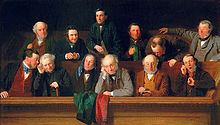Philocleon
| The Wasps | |
|---|---|

The Chorus in The Wasps comprises elderly jurors who briefly resemble wasps in their behaviour (Painting: 'The Jury' by John Morgan 1861, Bucks County Museum, England).
The Dramatis Personae in ancient comedy depends on interpretation of textual evidence. This list is based on David Barrett's translation. |
|
| Written by | Aristophanes |
| Chorus | Wasps (old men) Boys |
| Characters |
Silent Roles
|
| Setting | before house of Anticleon |
Silent Roles
The Wasps (Greek: Σφῆκες Sphēkes) is the fourth in chronological order of the eleven surviving plays by Aristophanes, the master of an ancient genre of drama called 'Old Comedy'. It was produced at the Lenaia festival in 422 BC, a time when Athens was enjoying a brief respite from the Peloponnesian War following a one-year truce with Sparta.
As in his other early plays, Aristophanes pokes satirical fun at the demagogue Cleon, but in The Wasps he also ridicules one of the Athenian institutions that provided Cleon with his power base: the law courts. The play has been thought to exemplify the conventions of Old Comedy better than any other play, and it has been considered to be one of the world's greatest comedies.
The play begins with a strange scene—a large net has been spread over a house, the entry is barricaded and two slaves are sleeping in the street outside. A third man is positioned at the top of an exterior wall with a view into the inner courtyard but he too is asleep. The two slaves wake and we learn from their banter that they are keeping guard over a 'monster'. The man asleep above them is their master and the monster is his father—he has an unusual disease. The two slaves challenge the audience to guess the nature of the disease. Addictions to gambling, drink and good times are suggested but they are all wrong—the father is addicted to the law court: he is a phileliastes (φιληλιαστής) or a "trialophile." We are then told that his name is Philocleon (which suggests that he might be addicted to Cleon) and his son's name is the very opposite of this—Bdelycleon. The symptoms of the old man's addiction are described for us and they include irregular sleep, obsessional thinking, paranoia, poor hygiene and hoarding. We are told that counselling, medical treatment and travel have all failed to solve the problem and now his son has turned the house into a prison to keep the old man away from the law courts. Bdelycleon wakes and he shouts to the two slaves to be on their guard—his father is moving about. He tells them to watch the drains, for the old man can move like a mouse, but Philocleon surprises them all by emerging instead from the chimney disguised as smoke. Bdelycleon is luckily on hand to push him back inside. Other attempts at escape are also barely defeated. The household settles down for some more sleep and then the Chorus arrives—old jurors who move warily (the roads are muddy), they are escorted by boys with lamps (it is still dark). Learning of their old comrade's imprisonment, they leap to his defense and swarm around Bdelycleon and his slaves like wasps. At the end of this fray, Philocleon is still barely in his son's custody and both sides are willing to settle the issue peacefully through debate.
...
Wikipedia
